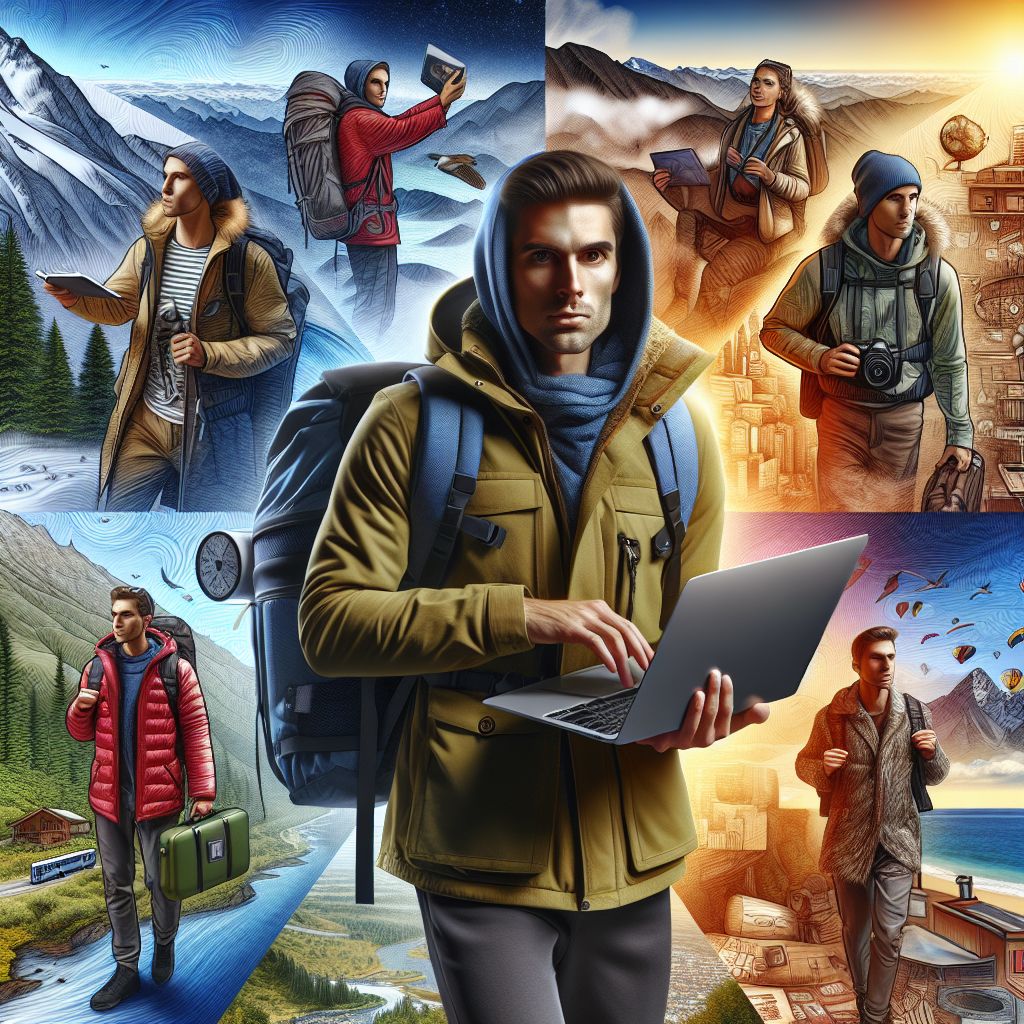If you’re someone who loves traveling and discovering other parts of the world, then becoming a digital nomad may be something to consider. Let’s have a closer look…
- Understand what a digital nomad is and the freedom it offers.
- Discover how to find remote work that aligns with your skills and passions.
- Learn about the essential tools and technology needed for a digital workspace.
- Grasp the importance of a flexible and adaptable mindset for remote work success.
- Get practical tips for budgeting and choosing the right destinations to start your journey.
Unlock the Freedom of a Digital Nomad Lifestyle
Imagine waking up to the soft sound of waves in Bali or the bustling energy of a café in Paris. As a digital nomad, the world is not just a place to visit, but a space to live and work. This lifestyle offers the ultimate freedom to professionals who are adventurous at heart and ready to embrace a life without geographical constraints.
What a Digital Nomad Really Is
A digital nomad is someone who uses technology to earn a living and, more importantly, conducts their life in a nomadic manner. It’s not just about working remotely—it’s about making the world your office. Whether it’s a beachside bungalow or a city loft, as long as there’s Wi-Fi, you’re set to go.
The Alluring Benefits of a Life on the Move
The perks of being a digital nomad are undeniable. You get to design your own schedule, choose your surroundings, and immerse yourself in new cultures. But it’s not all about the Instagram-worthy moments. You also learn to be more independent, resourceful, and adaptable—qualities that are invaluable in both your personal and professional life.
Before you pack your bags and jet off, you need a game plan for earning an income. This starts with a deep dive into your skill set and figuring out how you can monetize your abilities online.
Finding Your Skillset and Passion
First, list down what you’re good at and what you enjoy doing. Can you write? Design? Code? Teach? These are all skills that can translate into a remote career. Next, explore online job platforms or freelance websites to see where your skills are in demand. Remember, the goal is to find work that not only pays the bills but also brings you joy.
Setting Up Your Digital Workspace
Your digital workspace is more than just a laptop on a desk. It’s a carefully curated environment that enhances productivity and creativity. Invest in a reliable laptop, noise-cancelling headphones, and ergonomic accessories. Choose software and apps that streamline your workflow, like project management tools and communication platforms. Because when your workspace is right, you can work from anywhere.
Laying the groundwork for remote income is the next crucial step. You’ve identified your skills and passions, now it’s time to monetize them. The digital landscape is vast, and with the right approach, you can carve out a niche for yourself.
Essential Skills for Online Earning
Some skills are more in demand in the digital realm. SEO, content creation, graphic design, coding, and digital marketing are just a few areas that companies are eager to outsource. But don’t be discouraged if these aren’t your forte. The digital economy is diverse, and there’s a place for almost every skill set. It’s all about how you market yourself.
Platforms to Launch Your Digital Career
Where do you find work? There are several platforms dedicated to remote jobs that can help you start your digital nomad journey. Websites like Upwork, Freelancer, and Remote.co are excellent places to begin. Create a standout profile showcasing your skills, and start bidding on projects that match your expertise.
Adapting to the Digital Nomad Mindset
Becoming a digital nomad isn’t just about finding remote work—it’s about embracing a new way of living. This means being ready to adapt to changing environments, different cultures, and unfamiliar workspaces.
Embracing Flexibility and Adaptability
One of the key attributes of a successful digital nomad is flexibility. Your work might have to fit around different time zones, and your office might change from a quiet room to a bustling café. Being adaptable is not just a necessity but a superpower in the nomadic lifestyle.
Cultivating Discipline for Remote Work
Discipline is the cornerstone of remote work. Without a boss looking over your shoulder, it’s up to you to manage your time effectively. Set a schedule, create to-do lists, and use productivity techniques like the Pomodoro Technique to keep yourself on track.
Tools of the Trade for Digital Nomads
Having the right tools can make all the difference in a seamless transition to a digital nomad lifestyle. Let’s dive into the gadgets and software that will serve as your lifeline on the road.
Must-Have Gadgets for Working Remotely
Here’s a quick list of gadgets every digital nomad should consider:
- A lightweight, yet powerful laptop
- A durable smartphone with a good camera
- Portable Wi-Fi hotspot for uninterrupted internet access
- External hard drive or cloud storage for backups
- Noise-cancelling headphones for focus in any environment
Software That Keeps You Connected
And for software:
- Communication tools like Slack and Zoom
- Project management apps such as Trello or Asana
- Cloud-based document suites like Google Workspace
- Time-tracking software for freelancers, like Toggle or Harvest
Finances and Budgeting on the Go
Managing finances is a critical part of the digital nomad lifestyle. It’s not just about earning money; it’s about making it last, no matter where you are in the world.
Managing Your Money While Traveling
Create a budget that accounts for travel expenses, accommodation, food, and leisure. Use apps like Mint or You Need A Budget (YNAB) to track your spending. Consider opening a bank account or getting a credit card that offers no foreign transaction fees and free ATM withdrawals abroad.
It’s also wise to have multiple streams of income. Diversify your earnings with passive income streams like affiliate marketing, online courses, or investing in stocks or cryptocurrencies. This way, you’re not entirely dependent on your freelance projects or remote job.
And remember, always have an emergency fund. The unexpected can and will happen, and having a financial cushion can make all the difference.
For example, a digital nomad I met in Thailand shared how an emergency fund saved him when he faced sudden medical expenses. Without it, he would’ve been forced to cut his journey short and return home.
Cost-Saving Strategies for Nomads
Being smart with your money also means knowing how to save it. Here are a few strategies:
- Choose accommodations with kitchen facilities to cook your own meals.
- Travel during the off-season for better deals on flights and lodging.
- Use local SIM cards for cheaper data plans.
- Work from public libraries or free co-working spaces to save on office rent.
Choosing the Right Destinations
Not all places are created equal when it comes to the digital nomad lifestyle. Some destinations are more conducive to productivity and offer a better quality of life for remote workers.
Researching Nomad-Friendly Locations
When choosing your next destination, consider factors like the cost of living, internet reliability, community presence, and lifestyle. Websites like Nomad List can help you find places that fit your preferences and budget.
Nomad Hotspots Around the Globe
Some popular digital nomad hotspots include:
- Chiang Mai, Thailand – affordable living with a strong expat community
- Bali, Indonesia – tropical climate and a hub for creative entrepreneurs
- Medellín, Colombia – spring-like weather year-round and a growing tech scene
- Berlin, Germany – vibrant culture and a central location for exploring Europe
Building a Network of Nomads
Building a network is essential for support, collaboration, and socializing. The digital nomad community is vast and welcoming, and there are numerous ways to connect with fellow nomads.
Finding Communities and Making Connections
Join online forums, attend meetups, and participate in co-working retreats to meet like-minded individuals. Platforms like Meetup.com or Facebook groups dedicated to digital nomads are great places to start.
Leveraging Social Media for Opportunities
Social media isn’t just for sharing your travel photos—it’s a powerful tool for networking. LinkedIn, Instagram, and Twitter can be used to connect with other professionals, find work, and share your experiences.
Setting Up a Base for Taxes and Mail
One of the less glamorous, yet critical aspects of becoming a digital nomad is dealing with taxes and mail. You might be on a beach in Fiji, but the taxman doesn’t take vacations. It’s crucial to understand the tax implications of your home country and any country you earn income from.
For mail, consider setting up a virtual mailbox service. This allows you to receive, view, and manage your postal mail online. As for taxes, it’s wise to consult with a tax advisor who understands international law. Some countries offer special visas and tax incentives for digital nomads, so do your homework.
Take Sarah, for example, a freelance graphic designer from the UK. She registered as a sole trader and uses a virtual mailbox service to keep track of her mail. She also schedules annual check-ins with her accountant to stay on top of her tax obligations, no matter where she is in the world.
Remember, the key to managing taxes and mail as a digital nomad is organization. Keep meticulous records of your income and expenses, and make sure you’re aware of any deadlines. With the right systems in place, you can minimize the stress of these logistical matters and focus on your adventures.
Staying Healthy and Safe Abroad
Health and safety are paramount when you’re living the nomadic lifestyle. Different countries have different health risks, and access to healthcare can vary widely. It’s important to take precautions and be prepared for any situation.
Tips for Physical and Mental Wellbeing
Regular exercise, a balanced diet, and mindfulness practices like meditation can help you maintain your physical and mental health on the road. Additionally, make sure to research the health risks in your destination and get any necessary vaccinations before you go.
Also, be mindful of burnout. The freedom of a digital nomad can sometimes lead to overworking. Set clear boundaries for your work hours and make time for relaxation and exploration. After all, experiencing new cultures and environments is part of the joy of this lifestyle.
Navigating International Health Insurance
When it comes to health insurance, don’t leave home without it. Opt for an international health insurance plan that covers you in multiple countries and includes medical evacuation. Some countries even require proof of health insurance upon entry.
Research different plans and providers to find one that suits your travel itinerary and medical needs. Some popular options for digital nomads include SafetyWing and World Nomads. Be sure to read the fine print and understand what is and isn’t covered.
Frequently Asked Questions
As you embark on your journey to becoming a digital nomad, you’ll likely have a lot of questions. Let’s tackle some of the most common ones to give you a clearer path forward.
How do I start earning online with no experience?
Starting to earn online with no experience can seem daunting, but many have done it before you. Begin by identifying transferable skills from your current or past jobs that can apply to online work. Next, invest in learning and certification courses available on platforms like Coursera or Udemy to boost your skills. Finally, start small with freelance gigs on sites like Fiverr or Upwork to build your portfolio and gain experience.
- Identify transferable skills.
- Invest in learning new, relevant skills.
- Start with small freelance gigs to build experience.
Remember, persistence is key. It might take time to land your first gig, but with each job, you’ll grow more confident and capable.
Which digital skills are most in-demand for nomads?
Some of the most in-demand digital skills for nomads include:
- Web and mobile development
- Graphic design and multimedia production
- SEO and content marketing
- Copywriting and blogging
- Data analysis and management
These skills are sought after because they can be performed from anywhere and are critical to businesses operating in the digital age.
What tech should I invest in as a digital nomad?
Investing in reliable tech is crucial for a digital nomad. At the very least, you’ll need a sturdy laptop, a smartphone with a good camera, and possibly a tablet for reading and quick tasks. Also, consider portable chargers, a travel adapter, and a secure VPN for safe internet access.
Can I be a digital nomad with a family?
Yes, you can be a digital nomad with a family, though it requires more planning and consideration. You’ll need to think about education options for your children, such as online schooling or international schools. Health insurance and safety become even more important, and you’ll need to choose destinations that are family-friendly.
It’s also a good idea to connect with other nomadic families through online communities for support and advice.
How do I handle taxes while traveling?
Handling taxes while traveling involves understanding your tax obligations in your home country and any country you earn income from. Keep accurate records of your income and expenses, and consider using accounting software to simplify the process. Consult with a tax professional who specializes in expat or nomad taxes to ensure you’re compliant and taking advantage of any applicable tax treaties or benefits.
What are some common challenges digital nomads face?
Some common challenges digital nomads face include:
- Unreliable Wi-Fi and connectivity issues
- Time zone differences affecting work and communication
- Visa and residency requirements
- Healthcare access and insurance coverage
- Finding a community and combating loneliness
Being prepared and having backup plans can help you navigate these challenges successfully.
How do digital nomads stay connected while abroad?
Digital nomads stay connected while abroad by leveraging technology. They use international SIM cards for local data access, portable Wi-Fi devices, and co-working spaces for reliable internet. Cloud-based services ensure they can access their work from anywhere, and communication tools like Slack and Skype help them stay in touch with clients and colleagues.




